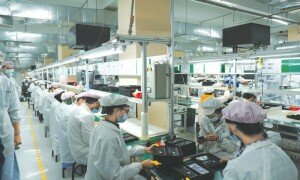
Mobile technology is at the heart of the digital transformation underway in the country. With government and private sector organisations using digital platforms to increase engagement and improve service delivery to citizens, mobile broadband networks now cover 80 per cent of the population, and 97pc of internet connections are based on mobile connectivity.
According to Dawn Newspaper, Mobile technology also enables the application of the Internet of Things (IoT) across areas, including agriculture, clean energy and safe water solutions, as the government plans to roll out 5G technology by summer.
While mobile technology is playing an increasingly important role in economic growth through direct contribution to the GDP and driving productivity and efficiency gains across different sectors of the economy, the mobile ecosystem continues to generate jobs in other sectors.
Pakistan is considered one of the fastest-growing countries in the telecommunication market. There is an increasing demand for mobile handsets. In order to maintain consistent growth in future, the government has recognised the potential of digital transformation by devising a well-defined mobile policy to encourage local assembly and manufacturing of mobile devices.
The number of domestic players has reduced to 30 from the initial 46 companies because of the pandemic and import restrictions
According to Ali Raza, the marketing manager for Tecno Mobile Pakistan, the initiation of the Device Identification, Registration and Blocking System (DIRBS) in 2019 by the Pakistan Telecommunications Authority (PTA) has proved vastly useful in curbing illegal import channels for mobile phone devices into the country. “This paved the way for the Mobile Device Manufacturing Policy of 2020 import substitution, production and exports.”
The policy had set a 49pc localisation target, including 10pc localisation of parts of the motherboard and 10pc localisation of batteries. In light of the policy, the PTA issued Mobile Device Manufacturing (MDM) Regulations in 2021, enabling local and global mobile phone companies to assemble and manufacture mobile devices in Pakistan.
The PTA data shows that local assemblers produced 19.2 million units between July and November last year compared to 1.4m commercially imported handsets. In 2020, Pakistan imported 24.5m mobile handsets as compared to 13m locally assembled units, showing that local assemblers have successfully displaced commercial imports since the launch of the policy.
“The government’s mobile manufacturing policy to attract major mobile brands to establish their plants in Pakistan has proved to be the first step towards the establishment of a competitive local manufacturing market. Though the localisation remains low, the industry has benefited the economy in terms of import substitution, job creation, technology transfer and affordability for consumers,” Mr Raza argues.
A sector report by the Pakistan Credit Rating Agency points out that the market was largely import-driven between FY17 and FY21, which grew at an average annual rate of 3pc. “However, a sudden shift was observed in FY22, when commercial imports of mobile devices declined by a whopping 58pc from 25m units to 10m units. Simultaneously, local manufacturing during the same period increased from 13m units to 25m units. This mainly resulted from supporting government policies.”
“Ever since the introduction of the mobile phone assembly/manufacturing policy, the industry has rapidly grown and increased capacity and production volume to meet the domestic demand for both feature and smartphones. For instance, we are producing 500,000-800,000 units per month. After the policy was announced, 46 companies had set up their assembly plants. Some have closed down because of the pandemic and later restrictions on the import of components due to dollar liquidity issues. The number of active players in this industry has now reduced to 30 from the initial 46 companies,” Mr Raza says.
“We are not only producing feature phones and cheaper smartphones but have also ventured into premium, high-end segments. Now, we are going to locally assemble 5G-enabled handsets as well. We are not just a mobile phone manufacturer but a tech company working for the betterment of Pakistan. We would like to bring change in Pakistan and make it one of the largest tech players globally.”
He says there are several advantages of the mobile manufacturing policy. “It has helped the country bring foreign investment by major brands, transfer technology, create jobs for skilled labour and technicians and make handsets affordable for consumers due to lower taxes on locally assembled sets. We are also exploring the opportunity for exports.”
Mr Raza takes exception to criticism that the industry has not made any significant strides towards the localisation of components like most carmakers. “It is unfair to compare this nascent industry with the 40-year-old car industry. After introducing the policy, our journey was interrupted by the pandemic and later by import restrictions due to dollar shortages and balance of payment troubles. So the two sectors cannot be compared,” he contends.
“Now that restrictions on imports have eased, we will move to the second stage of local manufacturing of accessories and exports. The key to the success of the policy is the support of the mobile ecosystem. The most important part of this ecosystem is policy consistency.”
He goes on: “We don’t have the capacity to manufacture motherboard chips or heavy metal components like batteries and sensors. But we can locally produce other less precision components and accessories. We will build the whole ecosystem if the policies remain consistent and the government supports them for the longer term.
“We are looking at the possibilities of localisation of whatever components we can make in Pakistan and then move into exports. At the moment, Tecno, a Chinese brand, has very small exports. The industry is pushing the government for incentives for developing an export ecosystem.”
Tecno Pakistan is part of China’s Transsion Holding, which is operating in 70 countries across the globe. “We are a global company with a local approach. We are the top brand in Africa and among the top three mobile brands in the Indian subcontinent. We cater to all market segments, from affordable handsets to expensive ones,” Mr Raza explains.
He repeatedly argues for policy consistency for the creation of a favourable ecosystem for localisation and exports. “Telenor’s decision to exit Pakistan and sell its local operations for $400m, at which it had acquired spectrum many years ago, says a lot about the country’s business landscape. It underscores that political instability, policy inconsistencies, and weak business culture and conditions don’t allow companies to realise their full potential in spite of heavy investments. Adherence to policies is crucial to achieve the objectives set by the government.”
The local assemblers, according to the PTA, have produced over 7m smartphones in the first five months of the present financial year compared to 8.8m in 2022. But, he adds, despite government policies to curb the grey mobile phone market, the size of the illegally imported or smuggled handsets remains pretty big.
“Pakistan’s growth potential for smart handset producers is immense. We have 110m unique mobile SIM owners, 60pc of which use feature phones. So the growth possibilities are great. But we need an ecosystem to not only meet domestic demand but also to export,” he adds.





